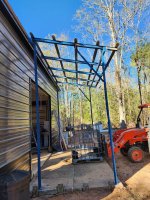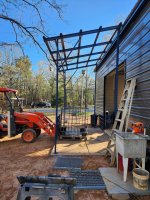woody
Veteran Member
- Joined
- Sep 20, 2010
- Messages
- 1,154
- Location
- Central Alabama
- Tractor
- Kubota B26, Kubota ZG222, Kubota L45, 1980 Ford 1700
Okay got an update and a question, the shop is up and usable I did finally finish the back wall where the two buildings tie together and with several rainy days it did not have any leaks where I joined them, there is some water seeping under the 10 foot rollup door.
Now for the question, I have a 100 amp breaker from my house feeding the old shop 4 wire with a ground rod at the old shop, for the new shop I have a 100 amp box with breaker what I am thinking is to connect to the incoming lugs in the old shop going to the breaker in the new shop including a neutral and a ground with a second ground rod for the second box, for some reason connecting to the lugs is bothering me, but each box is protected with it's own breaker the wires are rated at 100 amps or above. what are your thoughts?
Now for the question, I have a 100 amp breaker from my house feeding the old shop 4 wire with a ground rod at the old shop, for the new shop I have a 100 amp box with breaker what I am thinking is to connect to the incoming lugs in the old shop going to the breaker in the new shop including a neutral and a ground with a second ground rod for the second box, for some reason connecting to the lugs is bothering me, but each box is protected with it's own breaker the wires are rated at 100 amps or above. what are your thoughts?

